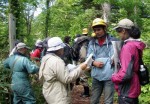An International Summer School
The GCOE-INeT international summer school, a field training program focused on "Frontier in Ecosystem Ecology of Northern Forests," was held June 14-20, 2009 in the Hokkaido University's experimental forests. The experimental forests are part of the Japan Long-Term Ecological Research Network (JaLTER) and GCOE-INeT is one of Hokkaido University's educational programs funded by the Japan Society for the Promotion of Science, and the Ministry of Education, Culture, Sports, Science and Technology (see www.ees.hokudai.ac.jp/gcoe/en/index.html for further information on the GCOE). Nineteen Ph.D students from eight countries (Australia, Bangladesh, China, India, Japan, Malaysia, the Philippines and UK) participated in the program.
Analyses of ecosystem processes across various space and time scales are essential to clarifying ecosystem functions and services as influenced by climatic changes, air pollution, land-use changes, and disturbances (both natural and anthropogenic). The main aim of the program was to encourage participants to develop research projects that include international perspectives. The program included a field session, a poster session, lectures, review discussions, and training on proposal writing that apply to ecosystem ecology.
After welcoming remarks by Prof. Yasuhiro Yamanaka (Hokkaido University), who is leader of GCOE-IFES program, the opening session saw Prof. Myron Mitchell (SUNY-ESF, Syracuse, NY) give a keynote lecture titled "Temperate Forest Watersheds: Responses to Atmospheric Pollutants and Climate Change." Subsequent lectures by Profs. Hideaki Shibata, Toshiya Yoshida, and Kentato Takagi (Hokkaido University) during the field course focused on various topics related to ecosystem ecology. The field programs included issues such as research site, approach, and instruments. Topics included "Community structure and functions in Northern Forests," "Soil process and biogeochemistry in snow-dominated regions," "Spatial patterns of ecosystem function and structure in landscapes," and "Carbon cycling and forest management in forest catchment." All field activities were held in Hokkaido University's experimental forests, which is a JaLTER core site.
The field sessions were closely associated with the proposal training session, which taught participants how to develop research proposals on the specific research themes introduced at each site during the field session. Based on observations and discussions during the field session, participants formed groups and each member was asked to discuss and prepare a summary of possible research proposals, including the "research theme," "research questions," "research hypothesis," and "approach." Each group then provided a brief summary of their discussion, followed by an active joint question and discussion period.
All the students were very active and showed positive attitudes during the entire program. Many interactive discussions, communication, and information exchange occurred among the participants. These interactions took place not only during the formal program, but also during informal social activities.
The organizing committee believes that the summer school experience is an invaluable resource that can help the students further their current research and facilitate future international communications and collaboration. Consequently, the summer school will be held once a year through 2012 and will utilize the various JaLTER sites and research stations in Hokkaido University.
The program organizing committee, comprising Hideaki Shibata (Chair), Takashi Kohyama (Vice Chair), Toshiya Yoshida, Kentaro Takagi, Karibu Fukuzawa, Masahiro Nakaoka (Hokkaido University), Myron J. Mitchell (visiting professor, State University of New York, College of Environmental Science and Forestry, USA), would like to thank all the staff of the GCOE unit, experimental forests, and Field Science Center for Northern Biosphere of Hokkaido University for their support. The committee would also like to thank the International and US-LTER Networks, as well as the International Project Office of the Global Land Project, the International Geosphere and Biosphere Program, and the International Human Dimension Program, for identifying and recruiting the participants, and for their helpful cooperation throughout these activities.

 Enlarge this image
Enlarge this image
